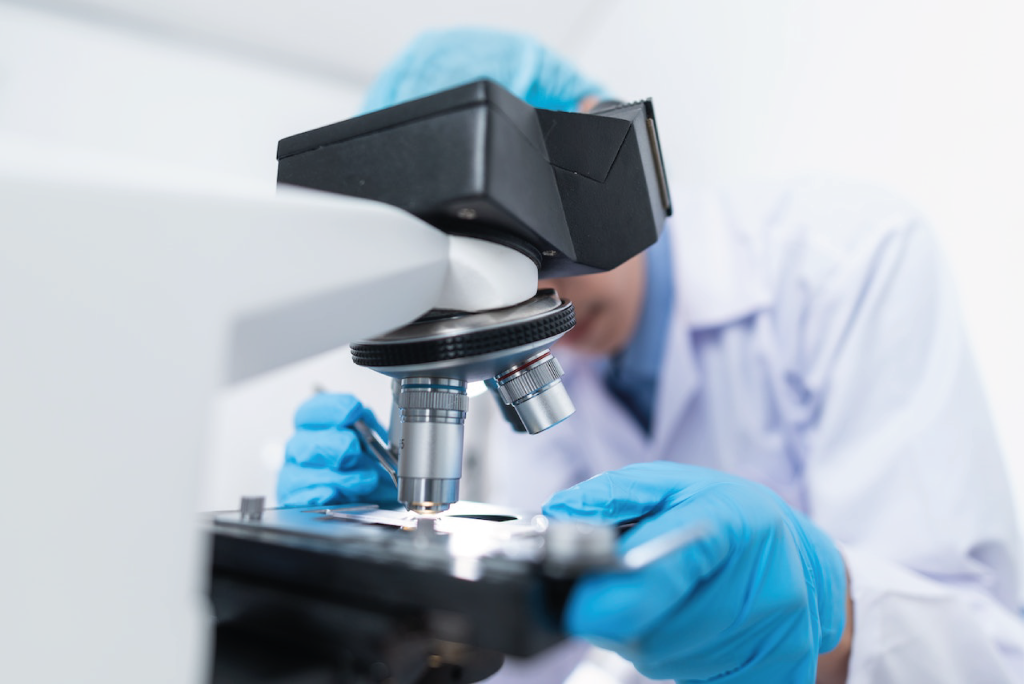
As our motto affirms: “We are a guarantee for the future.” We work every day committed to a maxim, to leave the world better than we found it. Our service vocation and our commitment to sustainable development means that at Acideka Group we have spent more than 50 years working for the well-being of people inside and outside the company.
As part of our sustainable commitment, since 2019 we have been collaborating with the Oncomatryx project, which aims to develop new anti-cancer drugs.
At Acideka Group we are committed to research
What is Oncomatryx?
ONCOMATRYX is a company created in 2009 that works on the development of products for the diagnosis and personalised treatment of invasive stages of cancer. The company is focused on a new approach to the diagnosis and treatment of cancer, attacking, not the tumour cells, but the cells that surround them and enhance their invasiveness, metastasis, immunosuppression and resistance of the tumour to other treatments.
Antibody Drug Conjugates and recombinant human proteins
ONCOMATRYX has developed antibody drug conjugates that target proteins located in the micro-environment of the tumour. It is a new approach to the treatment of cancer, not directed against the epithelial cells of the tumour but against the cancer-associated fibroblasts and the endothelial cells that cause their invasiveness, immunological suppression and drug resistance.
The product portfolio features 2 more advanced product lines: OMTX705 and OMTX703. Each one is currently in different stages of development. The company is notable for its ability to generate new drugs against new therapeutic targets within a short period of time (1 year).
- OMTX705 is an ADC (with AntiFAP-Cytolysin composition) that has shown a 100% inhibition of tumour growth and tumour regression, without side-effects in murine models of pancreatic cancer, invasive lung cancer and triple-negative breast cancer.
- OMTX703 is an ADC (with AntiENG-Cytolysin composition) that has shown a 100% inhibition of tumour growth and tumour regression of Ewing sarcoma in animal models, in collaboration with the Houston MD Anderson Cancer Centre.
- OMTX905 is a bi-functional antibody antiFAP‐TRAIL that has shown a significant inhibition of triple-negative breast tumour growth.
Results:
Here are the main conclusions from the studies carried out on OMTX705, that in general, have shown great effectiveness, without side-effects, in animal models with invasive solid human tumours (pancreas, lung, triple-negative breast cancer) for which there is currently no effective treatment.
Pancreatic Cancer:
- OMTX705 at non-toxic doses, causes a complete regression of the tumour in xenograft mice with human pancreatic tumours.
- OMTX705 displays a complementary and much more powerful activity than reference medicines ‐ gemcitabine and abraxane ‐ in the treatment of pancreatic cancer.
Triple-Negative Breast Cancer:
- OMTX705 exhibits anti-tumour activity in xenograft mice with human triple-negative breast tumours.
- OMTX705 inhibits tumour growth by 100% and induces regression of triple-negative breast tumours, alone or when combined with Paclitaxel, without side-effects.
Lung Cancer:
- OMTX705 exhibits anti-tumour activity in xenograft mice with human lung tumours.
- OMTX705 inhibits tumour growth by 100% and induces regression of lung tumours, alone or when combined with Paclitaxel, without side-effects.
- OMTX705, even at sub-optimal doses, causes complete tumour regression in xenograft mice with
Human immune systems and human lung tumours.
- OMTX705 exhibits much more potent anti-tumour activity in the lung in the presence of a
human immune system.
- OMTX705 exhibits a much more potent anti-tumour activity in the lung than Keytruda (MSD).
Immunotherapy
- OMTX705 exhibits very potent activity on its own as an anti-therapeutic treatment.
- Anti-tumour activity is optimised by combining it with Keytruda, increasing efficacy and delaying/preventing relapse.
Since 2019, we have collaborated with the company Oncomatryx’s R&D project on an anti-tumour compound (OMTX705) with €500,000 to date.
In 2022 they moved to the clinical research phase (application in people) and we have confirmed that we will continue collaborating with them. At Acideka Group, we trust in the investigation of new approaches that work to alleviate this disease that affects thousands of people.
A commitment to science and research is a commitment to a better quality of life.

